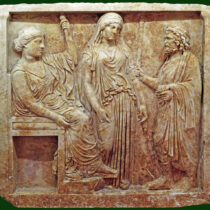Based on long-term fieldwork in Inner Mani (Southern Peloponnese), which has culminated in the well-known ethnographic publication The Last Word, the author presents dreaming as part of a divinatory complex, tied to the notion of moira. A person’s life, as structured by moira, is an economic system formed by relations of debt, obligation, expenditure and compensation. Thus, dream and other warning signs are analogous to the semiology of money. In contrast to the understanding of dreaming as psychological or irrational, the author posits dreaming as deep cultural structures. Divinatory dreaming, which is rooted in codified temporal transformation, is a privileged channel in a muted, under-represented historical experience of everyday life. Dreaming is another form of historicization and thus a theoretical language of analysis and representation equivalent to the “tools” of the “western ethnographer.” In this spirit, the author presents her own dreams as a form of vision and expression. She recognizes connections between the logic of dreams and the historical experience of economic transformation in her society and that of Inner Mani. Finally, since it is women who control the interpretation of dream and other warning signs in Mani, as is also the case in the rest of the Mediterranean, the author poses divinatory dreaming as a collective system, a sub-text in the communication of Mediterranean women.
Dream and Ethnography in Mani
24 Aug 2012
by Archaeology Newsroom
- A
- A
- A


